TL;DR: Best AML Software for Accountants
- Accountants must meet strict AML regulations to fight financial crime and protect client trust.
- The best tools automate AML checks, transaction monitoring, and due diligence processes.
- ComplyAdvantage – global coverage with machine learning and adverse media.
- SAS AML & NICE Actimize – enterprise-grade compliance and risk assessment.
- Sumsub & CCH iFirm AML – affordable and practical for small–mid firms.
- SmartSearch – trusted AML checks and instant verification in the UK.
- SEON – combines fraud prevention + AML.
- Ondato – strong in enhanced due diligence and biometric verification.
For modern accountancy firms, compliance goes far beyond tax filings and audits. Rising cases of financial crime and terrorist financing mean accountants must now meet strict AML obligations set by global regulatory bodies. That’s why demand for reliable AML software for accountants has never been higher, without it, firms risk fines, investigations, and the loss of client trust. Globally, an estimated 2–5% of GDP is laundered each year, roughly $800 billion to $2 trillion, underscoring why regulators are tightening expectations for professional services.
In this guide, we’ll break down what AML processes involve, explore the best AML solutions available, and share practical steps to help you choose the right AML software. The goal is simple: make AML compliance less of a burden and more of a reliable safeguard for accountants.
What Is AML Software for Accountants?
AML software for accountants is a type of anti money laundering software designed to help firms detect, report, and investigate potential financial crime. Its role is to simplify AML compliance by automating critical compliance processes and ensuring firms stay aligned with evolving AML regulations.
Key functions include:
- AML checks to verify the client’s identity and meet AML requirements
- Transaction monitoring to detect unusual or suspicious activity
- Customer screening against sanctions lists, politically exposed persons, and watchlists
- Adverse media screening tools and sanction scanner functions to flag reputational risks
- Due diligence processes and automated reporting to support regulatory investigations
For accountants, the challenge is unique. They handle highly sensitive client and financial data, which puts accountancy firms under more pressure from regulatory bodies than many other financial institutions. Unlike banks, accountants often juggle compliance alongside advisory and tax duties. This makes the right AML software solutions essential to serve new clients and existing clients while protecting the integrity of their financial systems.
Benefits of AML Software for Accountants
Adopting AML software solutions is more than a way to meet AML obligations, it’s a strategic investment for accountancy firms. The right platform doesn’t just help firms maintain compliance with strict AML regulations, it also makes day-to-day compliance processes more efficient.
Key benefits include:
- Streamlined due diligence – Automating customer screening, business verification, and adverse media checks ensures accurate results and reduces manual effort.
- Ongoing monitoring – Real-time transaction monitoring helps identify suspicious transactions early, supporting better risk management.
- Improved regulatory compliance – Regular updates to rules and watchlists mean firms can ensure compliance with the latest regulatory requirements.
- Audit-ready reporting – Automated reports make it easier to maintain detailed records and satisfy requests from regulatory bodies.
- Enhanced client trust – Showing that you use reliable tools for AML screening reassures both new clients and existing clients that their data is secure.
For accountants, these advantages are equally crucial as financial accuracy. By reducing reliance on manual AML processes and paper audit trails, firms can free up time, manage risks more effectively, and build stronger safeguards against financial crime.
Core Features of AML Software for Accountants
The best AML software for accountants is built with features that go beyond simple checks. These tools combine automation, intelligence, and integration to help firms maintain compliance and detect risks before they escalate into AML failures.
Essential features include:
- Transaction monitoring – Continuous review of client activity to flag suspicious transactions, unusual patterns, or attempts to bypass money laundering regulations.
- Customer screening and AML checks – Verifying a client’s identity, reviewing utility bills, and screening against sanctions lists, politically exposed persons, and other databases.
- Adverse media and sanction scanner tools – Monitoring for negative press or compliance risks using adverse media databases and automated sanction scanner checks.
- Due diligence processes – Automated workflows for both standard and enhanced due diligence, reducing manual errors and ensuring consistency.
- Risk assessment and classification – Categorizing clients by risk level to support smarter risk management and more tailored diligence processes.
- Ongoing monitoring – Real-time updates of watchlists and regulatory technology rules to ensure firms perform AML checks continuously.
- Automated reporting – Generating compliance-ready reports to help firms maintain detailed records and demonstrate accountability to regulatory bodies.
- Integration with accounting software and financial systems – Connecting across multiple platforms allows accountants to align AML controls with existing workflows.
- User friendly interface – A simple dashboard that reduces training time and makes AML processes easier for staff.
For accountancy firms, these features aren’t optional, they are the foundation of reliable AML solutions. By combining automation with machine learning, the best systems help accountants manage risks, improve accuracy, and save valuable time while meeting tough regulatory requirements.
Related: AI in Accounting, Will AI Replace Accountants
Best AML Software Solutions for Accountants
Choosing the right AML software can feel overwhelming with so many software solutions on the market. To make it easier, we’ve highlighted 12 trusted AML software providers that help accountants meet AML requirements, streamline compliance processes, and protect firms against financial crime.
ComplyAdvantage
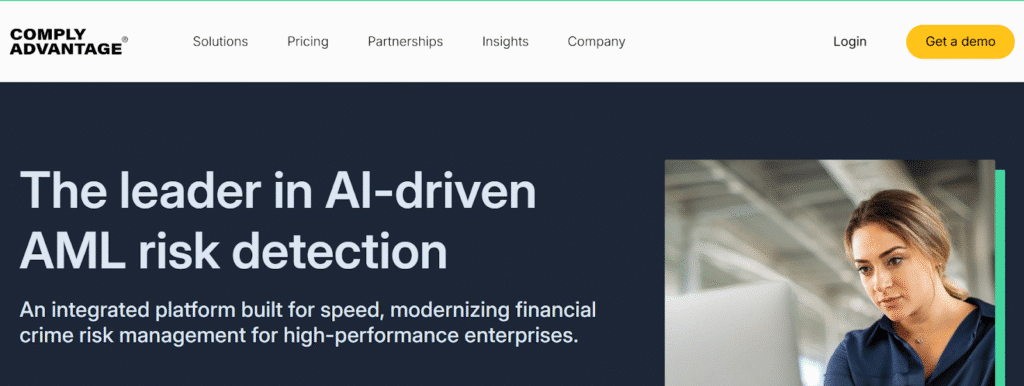
ComplyAdvantage is known as a global provider of advanced AML screening technology. It uses machine learning and adverse media data to identify high-risk individuals and businesses across international markets.
For accountancy firms, the platform makes it easy to run customer screening, detect suspicious activity, and track politically exposed persons during customer onboarding. Its API integrations also allow firms to connect compliance checks to existing accounting software and financial systems.
Pricing Info:
- The Starter Plan begins at USD 99.99/month for up to 1,000 monitored entities.
- There are higher / enterprise-level tiers for more usage or features, with custom quotes.
SAS AML
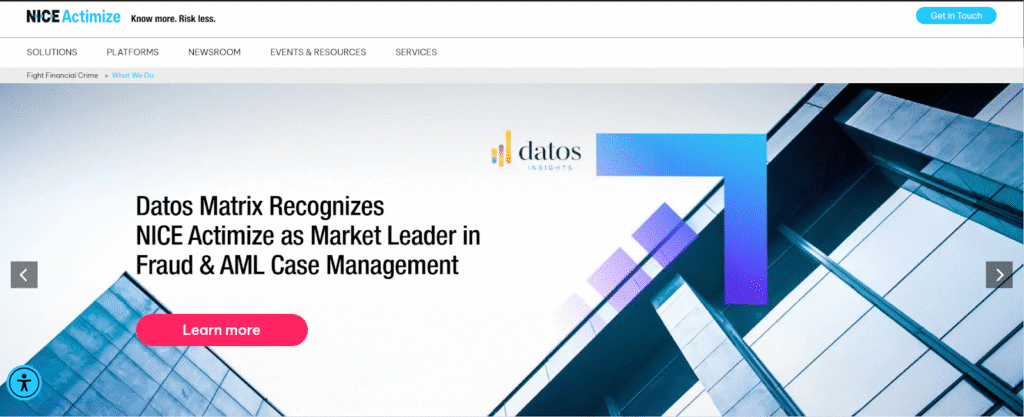
SAS offers one of the most comprehensive AML solutions, widely trusted by financial institutions and increasingly adopted by accountancy firms. Its strength lies in transaction monitoring and advanced risk assessment, helping accountants manage risks while staying aligned with AML regulations.
The platform also provides robust reporting features, making it easier for firms to maintain detailed records and prove compliance to regulatory bodies.
Pricing Info:
- No clear public pricing found. Vendor typically provides custom quotes based on firm size, transaction volumes and feature set. (Pricing not disclosed as per current public sources.)
Related: Account Receivable Automation, Appointment Scheduling Software
NICE Actimize

NICE Actimize is a leading AML software provider offering sophisticated risk management tools and automation for due diligence processes. It specializes in detecting suspicious transactions at scale, making it ideal for larger firms or those handling high volumes of new clients. Its regulatory technology is continuously updated to reflect global money laundering regulations, helping accountants ensure compliance without constant manual oversight.
Pricing Info:
No published pricing found publicly. Likely custom pricing upon request for enterprise clients.
LexisNexis Risk Solutions
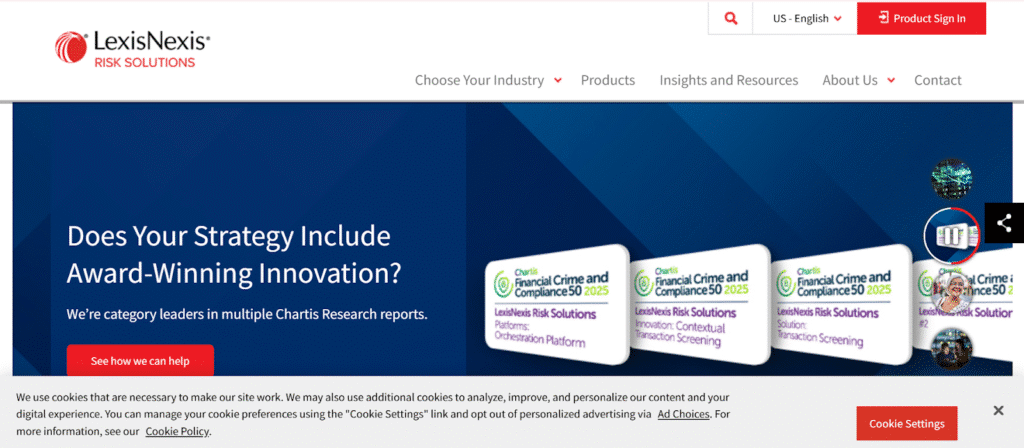
LexisNexis combines AML checks, adverse media screening tools, and transaction screening in a single platform. Its databases cover millions of entities worldwide, giving accountants access to reliable data for risk classification and business verification.
The software also provides automated alerts for suspicious activity, reducing the chance of oversight and allowing firms to focus on core accounting services.
Pricing Info:
- LexisNexis pricing is not openly published; as with many enterprise AML/p-screening tools, quotes depend on scale and features.
Sumsub
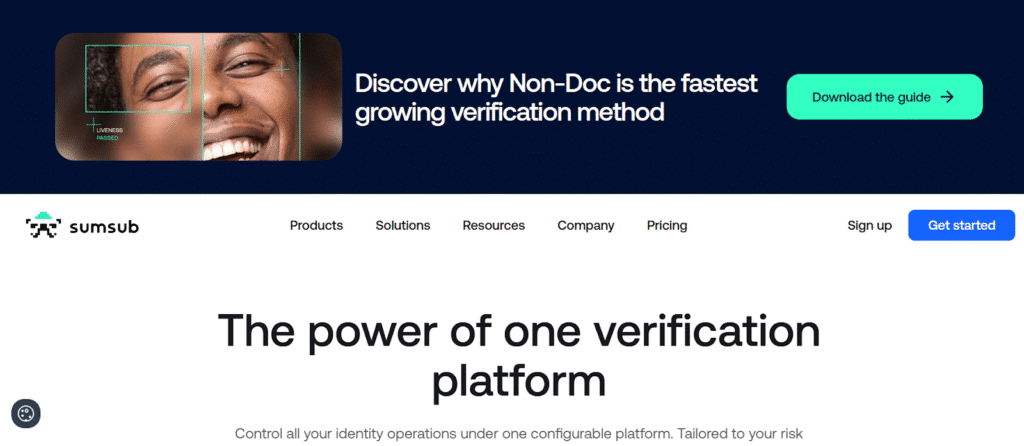
Sumsub is a fast-growing AML software provider that specializes in customer onboarding and automated KYC regulations. It streamlines due diligence by combining customer screening, sanction scanner tools, and adverse media checks into one interface.
For accountancy firms, Sumsub helps verify a client’s identity quickly while reducing manual errors. Its ability to adapt workflows to a firm’s requirements makes it especially valuable for smaller firms looking for flexibility in their AML processes.
Pricing Info:
- Basic Plan roughly USD 1.35 / verification, with a USD 149/month minimum commitment.
- Compliance Plan around USD 1.85 / verification, with USD 299/mo minimum for more regulated use-cases.
CCH iFirm AML
CCH iFirm AML is built specifically for accountancy firms, making it a practical choice for practices that want AML compliance built directly into their accounting software. It automates AML checks, creates a clear audit trail, and ensures firms can maintain compliance with local regulatory requirements. By focusing on simplicity, the platform provides a user friendly interface while still covering essentials like due diligence processes and transaction monitoring.
Pricing Info:
- Pricing is not publicly listed. Typically available via custom quotes from Wolters Kluwer, depending on region and features.
Nasdaq Verafin
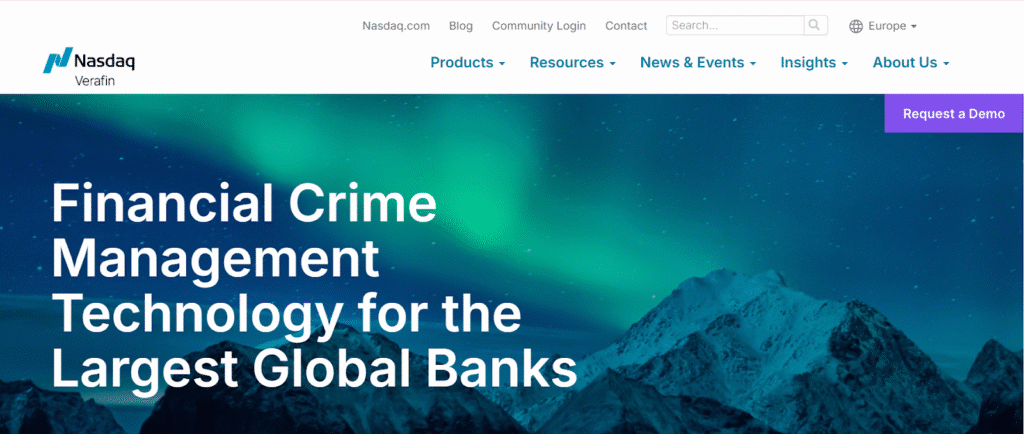
Nasdaq Verafin is widely recognized among financial institutions but is equally effective for accountancy firms. It offers advanced transaction monitoring, risk assessment, and ongoing monitoring capabilities, supported by powerful machine learning.
Accountants can use Verafin to flag suspicious activity, manage complex AML processes, and receive alerts that align with regulatory compliance standards. Its scalability makes it suitable for firms expecting to handle more new clients over time.
Pricing Info:
- No fixed public pricing. Verafin operates on an enterprise quote-based model tailored to firm size and needs.
SmartSearch
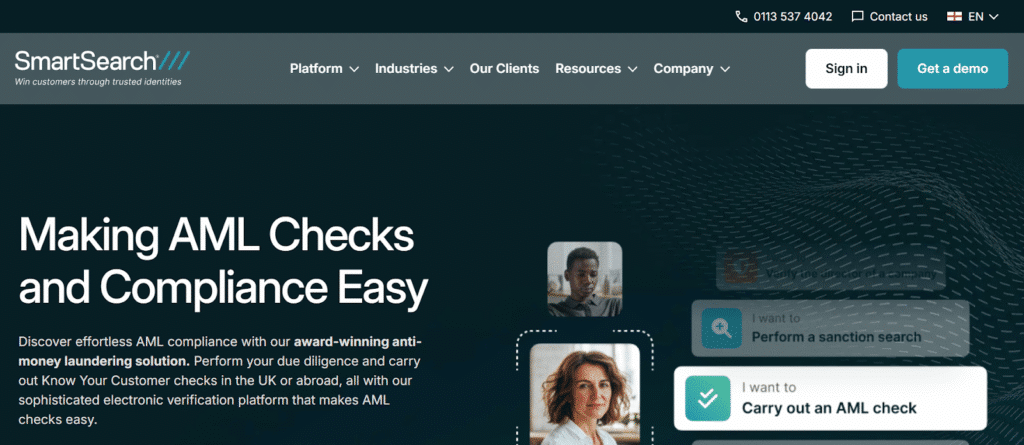
SmartSearch is a well-established AML software solution in the UK that focuses on identity verification and AML screening. It uses adverse media screening tools and sanction scanner functions to help firms perform AML checks thoroughly.
One of its standout features is instant electronic verification, which reduces reliance on paper documents like utility bills. For accountants, SmartSearch simplifies both due diligence and ongoing monitoring, ensuring firms can ensure compliance without delays.
Pricing Info:
- Starts around £495/year (≈ $500) for smaller practices in the UK. Larger firms receive custom pricing.
Salv
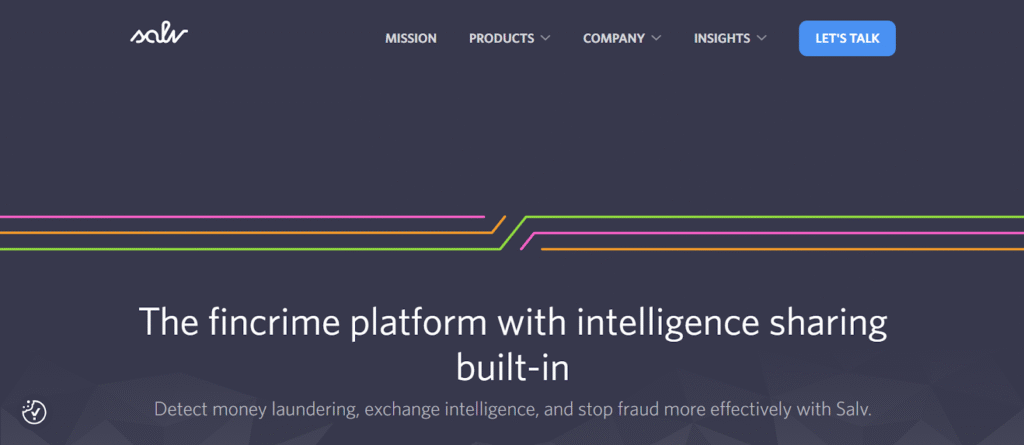
Salv is an innovative AML software provider focused on agility and speed. It combines transaction screening, suspicious activity detection, and ongoing monitoring into a single dashboard. For accountancy firms, Salv’s flexibility allows teams to quickly adapt to changing AML regulations and regulatory requirements. Its collaborative tools also make it easier for compliance teams and accountants to share data and streamline diligence processes across departments.
Pricing Info:
- Pricing not published. Salv provides custom quotes based on firm size and usage.
Amltrac (Fenergo)
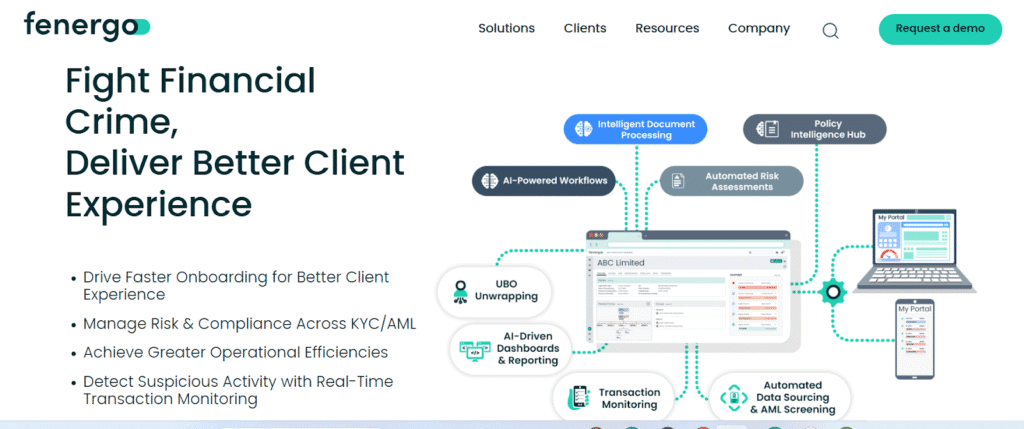
Amltrac, developed by Fenergo, offers robust AML solutions trusted by both financial institutions and professional service firms. It automates due diligence processes, strengthens risk management, and supports risk classification for new clients.
Its strong focus on regulatory technology ensures accountants can maintain compliance while handling complex AML processes. The platform is particularly effective for larger firms that need scalable, enterprise-level software solutions.
Pricing Info:
Pricing is not publicly listed. Fenergo generally works on enterprise license models with custom quotes.
SEON
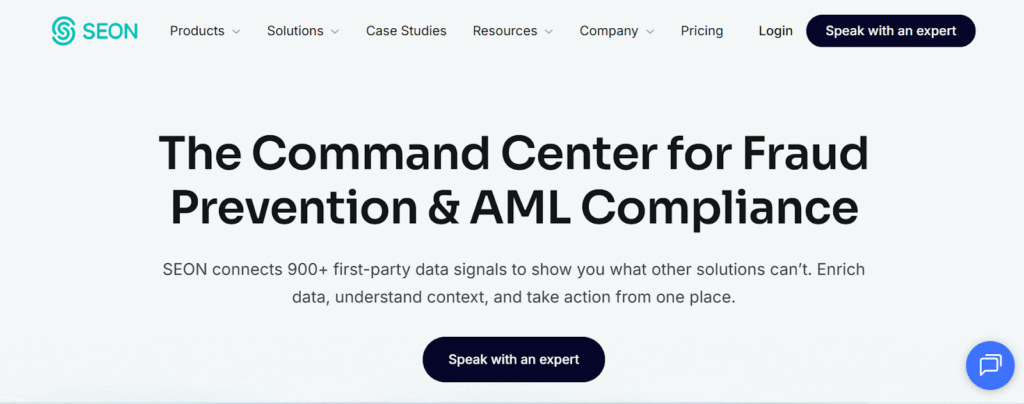
SEON is well known for its machine learning approach to fraud and financial crime prevention. It integrates adverse media analysis, customer screening, and sanction scanner features, helping firms perform AML checks without slowing down onboarding.
For accountants, SEON provides a flexible user-friendly interface that reduces friction during customer onboarding while ensuring compliance with AML requirements.
Pricing Info:
- Starter plan begins at about $699/month with 1,000 API calls. Free trial also available.
Ondato
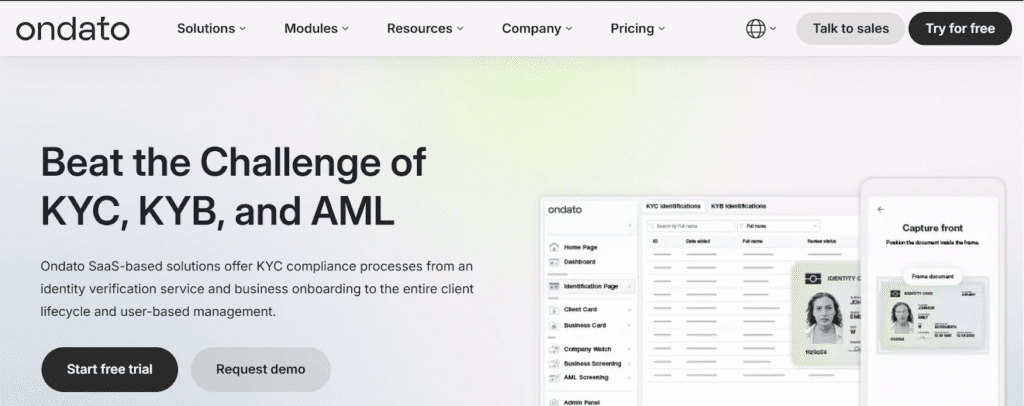
Ondato focuses on business verification and identity management, making it a strong choice for firms that want to reduce risk during new client intake. It supports both due diligence and enhanced due diligence, using adverse media screening tools, biometric checks, and AML screening against global watchlists.
By offering a seamless connection to multiple platforms, Ondato allows accountants to integrate compliance checks into their existing financial systems, giving them a smooth way to manage risks and ensure compliance.
Pricing Info: ‘
- Identity verification start from about €1,40 – €0,50
- Know your business cost From €600 per month
- Age verification cost €0,11 – €0,01 per verification
AML Compliance Best Practices for Accounting Firms
Adopting the best AML software solutions is only half the story, accountancy firms also need strong processes and staff awareness to remain AML compliant. The following best practices can help firms maintain compliance, reduce the risk of financial crime, and build confidence with regulatory bodies.
1. Conduct Risk Assessments
Regular risk assessment is essential for identifying high-risk clients and applying the right level of oversight. Accountants should use tools with built-in risk classification to manage risks more effectively and tailor their due diligence approach.
2. Verify Every Client’s Identity
Robust AML checks should be performed for both new clients and existing clients. This includes customer screening, reviewing documents like utility bills, and checking for politically exposed persons. Using automated tools reduces manual errors and helps firms perform AML checks consistently.
3. Establish Ongoing Transaction Monitoring
Compliance doesn’t end at onboarding. Firms must run ongoing monitoring and transaction monitoring to detect anomalies and suspicious activity. Automated systems help flag suspicious transactions early, ensuring firms can ensure compliance with evolving AML regulations.
4. Train Employees on AML Obligations
Even the best AML software for accountants can’t replace well-trained staff. Regular training ensures employees understand AML requirements, know how to identify suspicious activity, and escalate potential risks quickly. This builds a culture of accountability and awareness.
5. Maintain Detailed Records
Regulations require firms to maintain detailed records of client verification, due diligence processes, and compliance checks. Automated reporting in anti money laundering software makes this easier, allowing firms to respond quickly to audits or investigations from regulatory bodies.
How to Choose the Best AML Software
With so many AML software solutions available, selecting the right platform can feel overwhelming. The key is to match the firm’s requirements with a provider that offers the right mix of features, usability, and support. Here are the most important factors to consider when evaluating an AML software provider:
1. Define Your Firm’s Goals
Every firm has unique AML obligations and client profiles. Before investing, consider whether you need advanced transaction monitoring, detailed due diligence processes, or simple AML checks for lower-risk new clients.
2. Look for Must-Have Features
The best systems cover the essentials, AML screening, customer screening, and sanction scanner tools, while also offering advanced options like adverse media screening tools and ongoing monitoring. For firms handling higher risk, enhanced due diligence is equally important.
3. Evaluate Ease of Use
A user-friendly interface can make complex AML processes easier for staff to adopt. Platforms with clear dashboards, automated alerts, and guided workflows ensure accountants can remain AML compliant without wasting time on training.
4. Consider Pricing and Compliance Budget
Determine your AML budget early and filter your search by pricing models. Some software solutions charge per check, while others offer subscriptions. Balancing cost with compliance requirements ensures long-term sustainability.
Related: Project Management Software for Accountants, Digital Transformation for Accounting Firms
5. Check Support and Training
A responsive support team is critical. Verify whether the provider offers onboarding sessions, documentation, or access to compliance experts. Ongoing support ensures your firm can maintain compliance even when regulatory requirements change.
6. Integration Capabilities
Look for platforms that connect easily with accounting software and other financial systems. Working across multiple platforms allows firms to embed AML processes into existing workflows without disruption.
7. Use Reviews and Ratings
Customer feedback can reveal how a provider performs in practice. Independent ratings help confirm whether the AML software provider delivers reliable results and keeps up with evolving money laundering regulations.
Consequences of Non-Compliance with AML Regulations
Failing to comply with AML regulations can be devastating for accountancy firms. Beyond financial penalties, non-compliance undermines client trust, damages reputations, and can even lead to criminal consequences for individuals within the firm.
1. Heavy Fines and Penalties
Regulators impose severe financial penalties on firms that fail to meet their AML obligations. In recent years, AML failures have resulted in penalties exceeding £150 million, showing just how costly neglecting regulatory compliance can be.
2. Criminal Prosecution
In serious cases, suspicious activity that goes undetected may expose partners or staff to criminal liability. This could mean personal accountability for compliance breaches and, in extreme situations, prosecution tied to financial crime or terrorist financing.
3. Reputational Damage
Once a firm is linked to suspicious transactions, the damage to its reputation is often irreversible. Both new clients and existing clients may lose confidence in the firm’s ability to maintain compliance, leading to lost business and long-term harm.
4. Increased Scrutiny from Regulatory Bodies
Non-compliance often triggers heightened oversight from regulatory bodies, requiring firms to invest more time and resources into remediation. This not only disrupts daily operations but can also delay the onboarding of new clients.
5. Operational Disruption
Without strong AML processes, firms may find themselves unable to continue offering services until they can demonstrate they ensure compliance. This can stall growth, create uncertainty for staff, and weaken competitiveness.
Enhanced Due Diligence (EDD) for High-Risk Clients
Standard due diligence is required for every client, but some situations demand a deeper level of review, this is where enhanced due diligence (EDD) comes in. For accountancy firms, EDD provides a structured way to dig further into a client’s background, financial history, and potential links to financial crime.
Frequently Asked Questions (FAQs)
What software does AML use?
AML uses specialized anti money laundering software for AML checks, transaction monitoring, and customer screening.
How much does AML software cost?
Prices vary by AML software provider, but costs range from pay-per-check models to monthly subscriptions depending on features and firm size.
What is the best AML software for accountants?
Popular choices include ComplyAdvantage, SAS, NICE Actimize, LexisNexis, SmartSearch, and Nasdaq Verafin, each offers tailored AML solutions for accountants.
What is AML for accountants?
AML for accountants means following AML regulations and using tools to detect financial crime, verify clients, and meet compliance duties.
Do accountants do AML checks?
Yes. Accountants must perform AML checks on both new clients and existing clients to comply with money laundering regulations.
Who needs to perform anti-money laundering checks?
All regulated businesses, including accountancy firms, banks, and other financial institutions, must carry out AML screening and due diligence.
How much does an anti-money laundering check cost?
A single AML check typically costs between $2–$10, but costs vary by software solutions and provider.
Final Thoughts & Next Steps
Staying ahead of AML regulations is no longer optional, it’s an essential responsibility for all accountancy firms. The right mix of strong policies, well-trained staff, and modern AML software solutions makes it possible to detect suspicious activity, reduce exposure to financial crime, and maintain compliance with evolving regulatory requirements.
From transaction monitoring to enhanced due diligence, today’s tools help accountants streamline their compliance processes and protect both new clients and existing clients. The best approach is to carefully evaluate your firm’s requirements, choose the right AML software provider, and embed compliance into everyday workflows.
By acting now, firms not only meet their AML obligations but also strengthen client trust and gain a competitive edge in a landscape where security and accountability are equally crucial.






